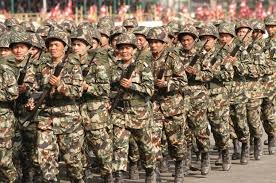Nepal’s army has deployed patrols on the streets of the capital Kathmandu, as the Himalayan nation reels from its worst unrest in decades.
Fierce protests against corruption and nepotism spiraled further on Tuesday into arson and violence.
The prime minister resigned as politicians’ homes were vandalised, government buildings were set ablaze, and parliament was stormed and torched.
But the “Gen Z” groups spearheading the protests have distanced themselves from the destruction, saying the movement has been “hijacked by opportunist infiltrators”.
On Wednesday, the streets of Kathmandu appeared calm, but smoke was still rising from burning buildings, and charred vehicles lay on roads.
Read also:
Nationwide curfews are in place until Thursday morning, the army has said, warning of punishment for anyone involved in violence and vandalism.
Twenty-seven people have been arrested for their involvement in violence and lootings, and 31 firearms have been found, it added.
The military is attempting to control a volatile situation, with PM KP Sharma Oli’s resignation leaving a leadership vacuum.
His government’s abortive attempt to ban social media triggered the demonstrations that saw 19 protesters killed in clashes with police on Monday.
Those deaths only fueled the unrest on Tuesday.
Scenes of violence and vandalism have come to illustrate the visceral intensity of the anti-government demonstrations.
Thousands of inmates have escaped from prisons around Kathmandu in the chaos, local officials told BBC Nepali.
Five young inmates were killed late on Tuesday when security forces opened fire on escapees from a juvenile correctional facility in Banke, in western Nepal.
The overall toll has since risen to more than 20.
The military has invited the Gen Z protesters to engage in peace talks. The student leaders are consolidating a fresh list of demands, one of their representatives told the BBC.
But many protesters are worried that the movement has been co-opted by “infiltrators”.
Tuesday’s protest, “organised by Nepal’s Generation Z, was conducted with a clear vision: to demand accountability, transparency, and an end to corruption,” read a statement issued by protesters.
“Our movement was and remains non-violent and rooted in the principles of peaceful civic engagement.”
The authors of the statement said they were actively volunteering on the ground to “responsibly manage” the situation, safeguard citizens, and protect public property.
They also said no further protests were scheduled from Wednesday onwards, and called on the military and police to implement curfews as necessary.
“Our intent has never been to disrupt daily life or to allow others to misuse our peaceful initiative,” the statement said.






